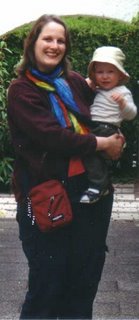(A friend of mine read my recent post about summer break and asked me how I’d define “diet mentality”. Here’s the answer to that. Part two will deal with ways out of diet mentality.)
- Diet mentality means going through your day thinking, “I’m fat. I’m fat. I’m fat.”
- And, “I shouldn’t have eaten this. Should I eat this? I shouldn’t eat this. Oh, what the heck. Now I’ve eaten it. I shouldn’t have eaten this. I’ll make up for it by not eating [insert food or meal of choice here].”
- Diet mentality means that you’re defining yourself and your worth by the number on the scale.
- Diet mentality thinks, if only this number were right, everything would fall into place.
- Dieting means, you’re trying to starve yourself or live on a restriction for a finite amount of time and then your life (and your eating) can turn back to “normal”.
- Diet mentality focuses on the number of the scale like, “Oh, I lost 2 pounds already. Now I can reward myself with ridiculous amounts of chocolate.” Or, “Oh, I gained 2 pounds. How could that have happened! I’ll eat only bread and water (or more likely vegetables, yoghurt and water) until they’re off again.” (Unless you believe in water-retention like I do.)
- Diet mentality means trying to fight for losing the same 5 pounds over and over again.
- Diet mentality means that if you’d only manage to be good for a few weeks, everything will be fine again.
But guess what, nobody’s going to give you a medal for “being good” or losing weight. (Well, apart from Weight Watchers, maybe.) And like Geneen Roth says,
“Thin people get cellulite, get sick and die, too.”
(I couldn’t find the source of this quote, but I can recommend all Geneen Roth‘s books. For starters try “When you eat at the refrigerator, pull up a chair.“)
And when you’ve finally lost that elusive two pounds, there will be the next goal:
- When I weighed 84 kg, I thought, “If only I were back at my pre-pregnancy weight of 78.”
- When I weighed 78 (before that) I thought, “If only I were back at 71.”
- When I was at 71 I thought, “I’m real fat, if only I were back at 69.”
And then 67, 65, 63, 60, 56. There it stopped, because I never weighed less as an adult or teenager. I was 16, I was love-sick, I was depressed, and I looked like a stick figure with ears for handles.
Look, stick-figure Susanne:
And here big Susanne:
Which one looks happier? (I know you maybe can’t see it, but big Susanne is much happier than stick-figure Susanne. Even though she feels fat all the time.)
So, the question is: How do you come out of diet mentality?
Stay tuned…
Technorati Tags: diet, diet mentality, Geneen Roth


Hey Susanne. This is really fascinating reading. I think you look lovely now. (And such a cutie you are holding, too!) Thanks for stopping by this weekend. I’ll be back for more!
Hey Susanne. This is really fascinating reading. I think you look lovely now. (And such a cutie you are holding, too!) Thanks for stopping by this weekend. I’ll be back for more!
I enjoyed your thoughtful post very much!
I am wondering, and surely you are the right person to ask–as I understand it, Gluck (sorry, I don’t know how to smoosh in an umlaut) means both good fortune AND happiness. If you are glucklich, you are both lucky and happy.
So how do you mentally distinguish between these concepts if you think, read, and write in German, which uses a single word for both? And I was wondering if a person who grows up speaking German equates them–perhaps you almost have to feel guilty, or at least confused, if you are fortunate (glucklich) but somehow not happy (glucklich)?
Thanks, Anne
Thank you for the wonderful post. How true you words are! I read somewhere that the root of the word happy is “doing good”. Not “feeling good”. Doesn’t that make so much more sense?
I have to say that although I see your perspective, I definitely agree with De that if you have to ask yourself if you’re happy, you probably are not. I think if you get to the place where you are questioning the level of enjoyment that you are deriving from life, then you are probably inherently saying that something is missing. Additionally, if you find yourself being ecstatically happy then you probably know the difference and are destined for some sort of let down. But, here again, De and I probably get along because of our dour natures…
amen. amen, amen.
every single word.
Anne, I’d have to write a whole post to explain this one, but I’ll try in short: though we only have one word for luck, fortune and happiness we nonetheless distinguish between “Glück haben”, that’s to be fortunate, and “glücklich sein”, to be happy. If we are “glücklich” we’re happy.
That kind of thing happens all the time when you’re shifting languages.
Lia, yes that makes sense.
Liv, as you know I don’t agree. And I seem to rather like dour people like De and you…
Thanks, Jen.
So, while I’ve been mulling this over, last night my husband said to me, “your blog is just one long bitch,”and it’s really, really not intentional. I feel a bit frustrated.
I checked out Gretchen’s blog and the posts you highlighted. I kind of agreed with the detractors of the “How not to be happy post,” but otherwise I liked her blog and added it to my feeds. (Christine Kane is another one you recommended whose blog I like a lot.) Regarding the quote, what I was thinking was closest to her suggestion that “perhaps Mill meant that happiness comes as a consequence of pursuing other goals, like love and work, and shouldn’t be a goal in itself.”
I originally began thinking about “happiness” because of the post in which Esereth was talking about people thinking that achieving “quick fix” goals (such as losing weight or getting the right job) will make them happy. I don’t think so, and actually relate with your description of a day that you realized you are happy.
This is why I’m so frustrated that my husband is disgusted with me. He thinks I am unhappy, and I’m not.
Well, this comment took me all day because I had no time free to sit down, so I’m leaving lots unresolved. But … less is more.